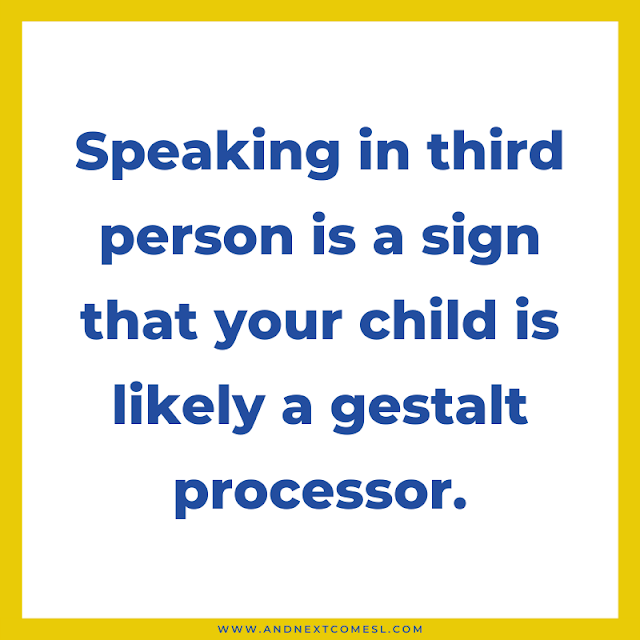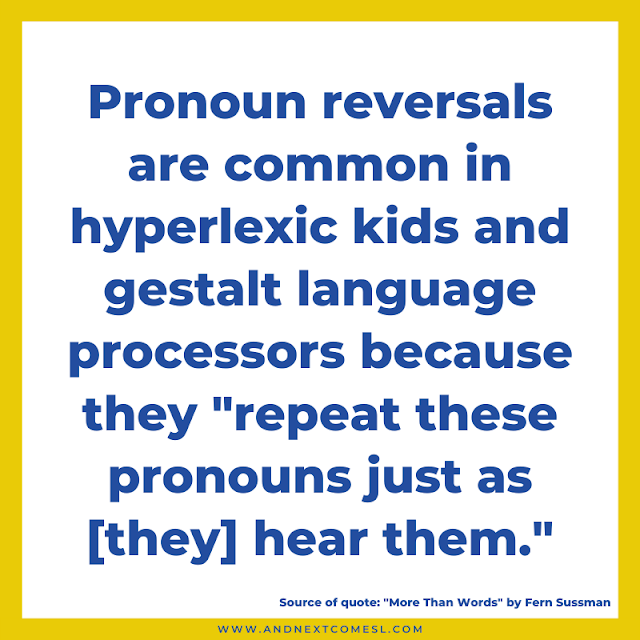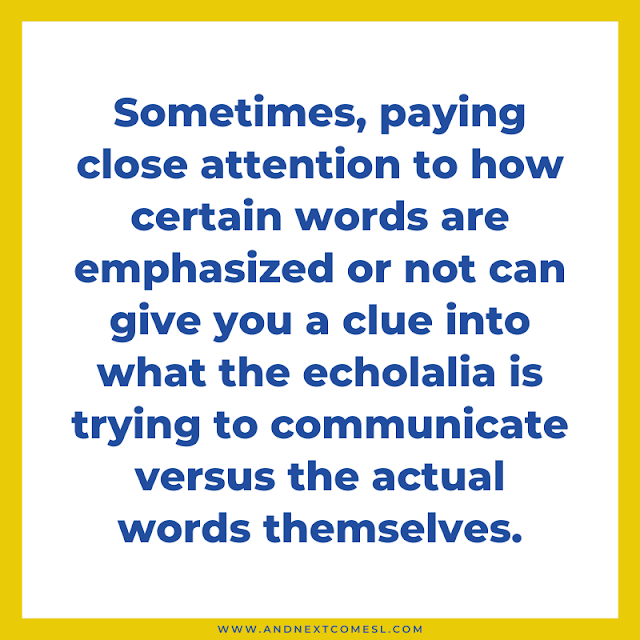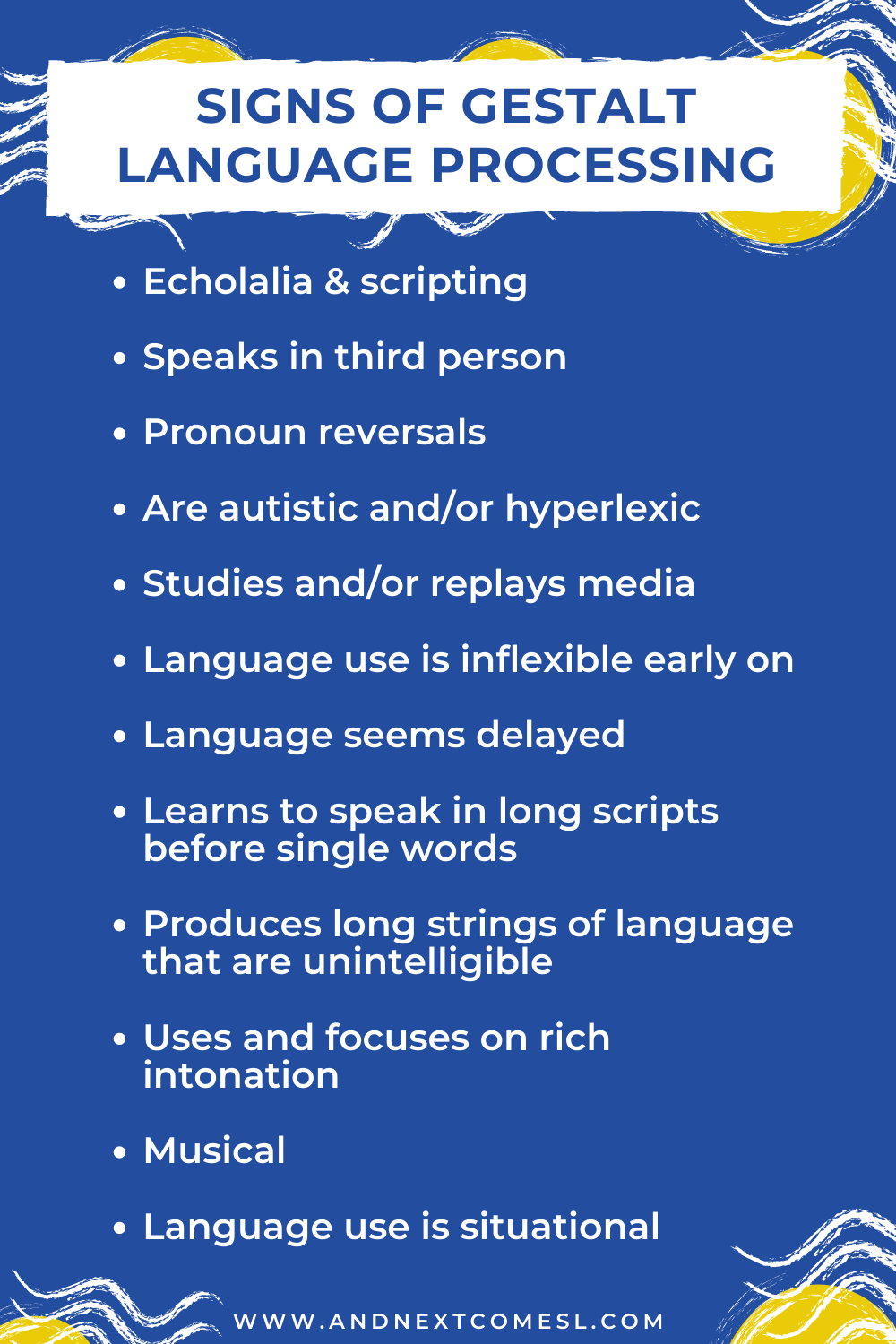Back in 2020, and continuing on into 2021, I set myself a goal to learn more about gestalt processing because I knew it was a vital part of understanding hyperlexia.
And boy did I ever learn a lot!
Seriously, certain things about hyperlexia make so much more sense once you learn about gestalt processing. I promise I'll write a post one day that digs more into this particular topic.
But, in the meantime, let's take a look at some signs that your child is a gestalt language processor.
Signs that Your Child is a Gestalt Language Processor
Please keep in mind that not all of these may apply to your child, but they are still signs of gestalt processing that you should be aware of.
1. Uses echolalia or scripts
One of the key signs that your child is a gestalt language processor is the presence of echolalia and scripting. Gestalt language processors learn language in chunks so it makes sense that they would communicate using those same chunks.
You can read more about the different types of echolalia here.
2. Speaks in third person
For the longest time, I remember my son would say things like, "J (his full name though) have a turn" whenever he wanted a turn to play with something instead of using first person language. I didn't really understand why back them because I didn't know about hyperlexia or gestalt processing at the time.
The point is: if your child is speaking in third person, it is a sign that they are likely a gestalt processor. It's part of pronoun reversals, which is the next sign we'll discuss.
3. Pronoun reversals
Mixing up pronouns while speaking (aka pronoun reversals) is a common characteristic in both hyperlexic kids and gestalt language processors. It's because they "repeat these pronouns just as [they] hear them without understanding what they mean." (source) You can read more about pronoun reversals here.
4. Are autistic and/or hyperlexic
It's important to note that gestalt language processing is not exclusive to autistic or hyperlexic kids. However, it is extremely common among these populations. I believe it is something like 75% or higher - can't seem to track down the source.
So if your child is diagnosed with either autism or hyperlexia, then there's a high likelihood that they are learning language via gestalt processing.
5. Studies and/or replays media
Gestalt processors will often script from media like books, TV shows, songs, or movies. In particular, you might notice them repeating specific parts of these media over and over. Examples might include reading the same book over and over or rewinding and rewatching a specific clip in a video.
6. Language use is inflexible early on
They rely on scripts and echolalia, but it usually stays the same each time without it being modified. It's not spontaneous and inflexible. However, as they grow and develop, their language will become more flexible and spontaneous.
7. Language seems delayed
How many times have I heard things like, "My child can read, but he can't carry on a conversation or talk well" (or something similar)? The answer is a lot.
If your child's language seems delayed, then that could indicate that they might be learning language differently and are a gestalt processor instead.
8. Learns to speak in long scripts before single words
This sign isn't surprising given that gestalt processors learn language in chunks. They view one phrase or script as a single word and have trouble breaking down those chunks into their individual words. So it's not surprising that when they do speak, it's in long scripts instead of individual words.
9. Produces long strings of language that are unintelligible
You or others might consider these unintelligible strings of language jargon. But, often it's just that their little mouths can't keep up with all the words they're trying to spit out. Either way, it's a sign of gestalt processing.
10. Uses and focuses on rich intonation
Often their language uses lots of rich intonation. Now, if you're not sure what intonation means, it refers to how the pitch of your voice goes up and down as you speak. Basically, think of it as how we make speech sound more interesting.
Gestalt language processors often use animated language that is exciting or lively.
Sometimes, paying close attention to how certain words are emphasized or not can give you a clue into what the gestalt processor's echolalia is trying to communicate versus the actual words themselves.
11. Musical
Many gestalt learners are naturally musical. Unsurprisingly then, lyrics from songs are often among the first scripts that they use. Case in point: how hyperlexic toddlers often sing the ABCs on repeat. And as if to prove my point further, I can hear my son singing from his room while I type this...good timing!
Their echolalia might also have a musical intonation (relates to previous point about how they focus on rich intonation). For instance, it's been written that hyperlexic kids "will pay more attention to your note than to your voice." (source)
Maybe you've even noticed that your child responds better when you sing something instead of saying it. Thank goodness my husband is a creative genius when it comes to making up catchy little jingles on the fly. Seriously, I think he was meant to be a jingle writer despite his obvious lack of musical talents otherwise.
12. Language use is situational
Many of the scripts or gestalts that these kids use are tied to specific experiences or feelings.
Basically, certain phrases just stick because of the emotion that is attached to them, whether that emotion is positive or negative.
So whatever emotion the child was feeling at the time they learned or acquired that particular script will be connected to that script going forward.
Remember that hyperlexic kids have strong memory skills (see strengths of a hyperlexic learner for more info) so it's really not that surprising that certain scripts would be linked to specific memories or feelings.
As a result, you can see then how their language use ends up being situational and why their language often won't be adaptable to other situations, at least not for some time.
Want to Learn More About Gestalt Language Processing?
If you'd like to learn more about gestalt language processing and the stages of Natural Language Acquisition, I highly recommend checking out the Meaningful Speech courses and their Gestalt Language Processing Handbook. Use coupon code DYAN to save 5% on the handbook or courses.
Learn more about the Gestalt Language Processing Handbook & Courses
A Summary of the Signs of Gestalt Language Processing
Okay I know that was a lot of information. So as a recap, here are the 12 signs that your child might be a gestalt language processor:
- They use echolalia and scripts
- They frequently speak in third person
- They mix up or reverse pronouns
- They are autistic and/or hyperlexic
- They study and/or replay media
- Their language use is inflexible early on
- There are language delays
- They learn to speak in long scripts before single words
- They produce long strings of language that are unintelligible
- They use and focus on rich intonation
- They are musically inclined
- Their language use is situational for long periods of time
Other Hyperlexia & Language Related Resources You'll Love
Echolalia in Hyperlexia: Terms You Should Know
40 Language Skills that Hyperlexic Kids Might Need Support With
Gestalt Learning & Hyperlexia: What Does it Mean to be a Gestalt Learner?














